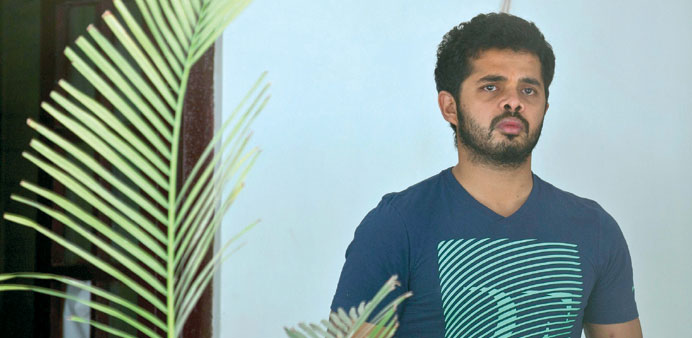|
Indian bowler Shanthakumaran Sreesanth and 38 others were charged yesterday over a spot-fixing scandal in the Indian Premier League that has rocked the sport, a prosecutor said. |
Indian prosecutors filed charges in a New Delhi court against the 39 alleging links to organised crime during this year’s edition of the Indian Premier League (IPL), a Twenty20 competition.
“The players and others have also been charged with criminal conspiracy, cheating and dishonesty,” special public prosecutor Rajesh Mohan
told AFP.
Two of Sreesanth’s teammates from the Rajasthan Royals franchise, Ajit Chandila and Ankeet Chavan, were also charged along with bookmakers and underworld figures.
They were charged under the Maharashtra Control of Organised Crime Act, Mohan said.
The three players were arrested in May along with scores of bookies as part of a police investigation into the spot-fixing scandal, which has caused outrage among fans in the cricket-mad nation.
Gambling is mostly illegal in India, but betting on cricket matches thrives through networks of underground bookies. Spot-fixing, in which a specific part of a game but not the result is fixed, is also illegal.
Sreesanth, who is the most famous of the three cricketers arrested having played 27 Tests for India, is alleged to have been paid tens of thousands of dollars after agreeing with bookies to deliberately bowl badly in an IPL match in May.
Police also alleged at the time of their arrest that his teammates agreed to similar deals in two other IPL matches. All three players have denied wrongdoing.
Rahul Dravid, a former Indian captain and current skipper of the Rajasthan Royals, has been named as a prosecution witness in the case, according to the Press Trust of India.
Delhi police told the trial court yesterday that the accused were “part of a larger betting syndicate” controlled by underworld don Dawood Ibrahim and his aide Chhota Shakeel, Mohan said.
The underworld figures were also named as accused in the charge sheet, which includes details of taped telephone calls and runs to 6,000-pages long, PTI said.
Dawood, an Indian national thought to be living in Pakistan, has been accused by Indian authorities of crimes including the 1993 Mumbai bomb blasts.
The accused cricketers “knowingly abetted the operation of this international organised crime syndicate”, according to the police.
An Indian court ruled yesterday a probe ordered by the country’s cricket chiefs into a betting scandal was illegal, causing further trouble for cricket head N. Srinivasan, reports said.
The Bombay High Court ruled a panel set up to probe the betting scandal in the Indian Premier League (IPL) competition was “illegal” and “unconstitutional”.
The ruling comes just two days after the panel’s report, leaked to the media, found no wrongdoing by senior cricket officials or IPL owners over the scandal.
Yesterday’s court ruling could derail the return of Srinivasan, who stepped aside temporarily as president of the Board of Control for Cricket in India (BCCI) on June 2, after his son-in-law was arrested, and later released on bail, over alleged links to illegal bookmakers.
Son-in-law Gurunath Meiyappan is one of the owners of IPL franchise Chennai Super Kings, a team bought by Srinivasan’s India Cements conglomerate when the league was launched in 2008.
The BCCI appointed the panel of two retired High Court judges in June to conduct an internal probe. The investigation was separate from probes being carried out by the Delhi and Mumbai police into the IPL scandal, with charges expected to be filed shortly.
A petition was lodged in the High Court against the BCCI-ordered probe, which cricket chiefs said last month would aim to clean up the sport in India.
“We find that the manner in which BCCI has constituted a panel under its own rules is illegal and unconstitutional,” NDTV quoted the court’s order as saying.
Amit Naik, a lawyer for the petitioner, told NDTV that it was now “up to the BCCI to see what is to be done next”.
A BCCI source declined to comment until lawyers had studied the order. The BCCI could still appeal to a higher court.

